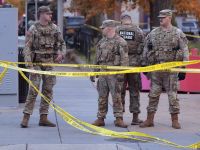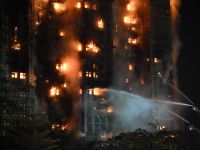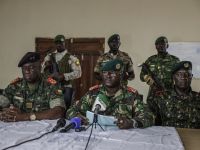US Secretary of State Colin Powell said Wednesday night Washington would continue to press the UN Security Council to pass a new text regarding Iraq.
Powell said the security council should give chief inspector Hans Blix's team "the most rigid procedures, the highest standards for Iraq to meet in order to satisfy the international community that they do not have, are not developing weapons of mass destruction and that which they do have can be destroyed."
"We do not believe that they should go back in under the old set of resolutions and under the old inspection regime and therefore we do not believe that they should go in until they have new instructions in the form of a new resolution," said Powell. "I am convinced a new resolution is appropriate, with tough consequences, so we are not out here a year from now talking about this all over again," he said.
"Pressure works. We're going to keep it up."
Powell comments came hours after the U.N. inspectors reached agreement with Baghdad about a new mission to reassess Iraq's alleged arsenal of weapons of mass destruction. Iraq said it expected an advance party in Baghdad in two weeks. A US State Department official in Washington said "we will move into thwart mode" if inspectors moved to return without a new resolution.
The Iraqis did not, however, bend to growing pressure from the United States and Britain to open Saddam Hussein's palaces and other so-called presidential sites to surprise inspections.
"The Iraqi representatives declared that Iraq accepts all the rights of inspection provided for in all the relevant Security Council resolutions," Blix told reporters. "There is a willingness to accept inspections that has not existed before."
In what was seen as a concession by Iraq, the talks resulted in "assurances from the Iraqis that we will have unconditional access to all sites," except the presidential sites, said Mohamed El Baradei, director general of the Vienna-based Atomic Energy Agency, where the talks took place.
In addition to the presidential sites, Baghdad had previously put a number of other locations off-limits to surprise visits, including the headquarters of the Republic Guard and Defense Ministry.
The Iraqi chief negotiator, Gen. Amir al-Sadi, said the issue of surprise inspections of Saddam's palaces and other presidential sites was "not a subject on the agenda." "Quite honestly I don't understand why it is so critical," al-Sadi said.
According to AP, the Iraqis handed over four CDs containing a backlog of monitoring reports for suspect sites and items, spanning June 1998 to July 2002, Blix said. Although that information was not yet analyzed, it would provide important clues about Iraqi weapons activity, he conveyed.
Blix was asked if the results of the two-day meeting were a rebuff to the United States and its ally, Britain.
The chief inspector said he would not be so "presumptuous" as to rebuff anyone and that he would report in "all humility" to the Security Council Thursday.
U.S., Britain
Before the declaration of the agreement President George W. Bush's spokesman said the assassination or exile of Saddam Hussein by his own people would be well received, saying "regime change is welcome in whatever form it takes."
Immediately after the Vienna agreement was announced, the State Department said any inspections should be deferred until the Security Council adopts a new resolution. However, spokesman Richard Boucher said the Bush administration had no objection to inspectors making arrangements in advance.
Meanwhile, British Prime Minister Tony Blair issued a strong statement Tuesday backing the United States. "Let us lay down the ultimatum. Let Saddam comply with the will of the U.N.," Blair said in a tough speech to a convention of his governing Labor Party.
"If we lose our collective will to deal with it, we will lose the authority not of the United States or of Britain, but of the United Nations," Blair said.
In Baghdad, Saddam presided over a regular weekly Cabinet meeting that discussed the American efforts toward a new resolution on Iraq.
"If those evil people think that the war drums that are beating can force Iraq to give up its national rights, its rights according to the U.N. charter and to the (past) Security Council resolutions, they are under an illusion," Iraqi TV quoted the unidentified spokesman as saying after the meeting. (Albawaba.com)
© 2002 Al Bawaba (www.albawaba.com)







